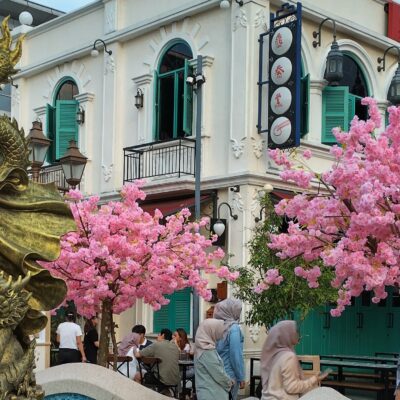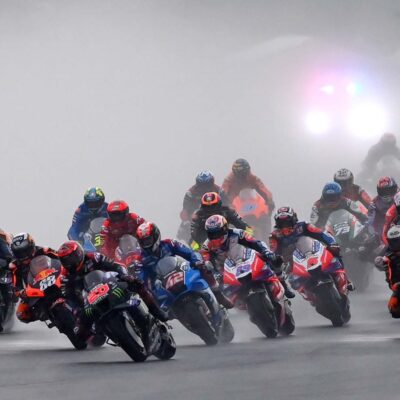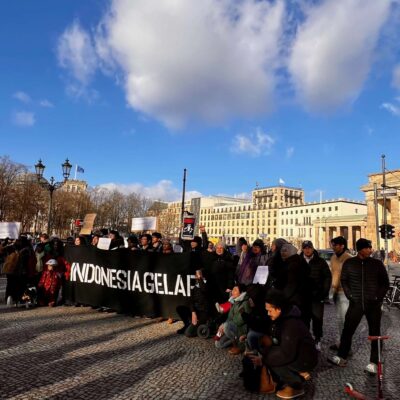Prabowo Subianto, the front-runner among the three men vying for the Indonesian presidency, has a major gripe. At the first presidential candidates’ debate, held in Jakarta in December, he complained that there was always someone who questioned his human rights record whenever he ran for office and was up in the polls. He had a point. But so do his detractors, though perhaps not the one they necessarily mean to raise.
Within the rather cloistered community of Indonesian politics-watchers, there has long been a debate about what to make of the changes since the fall of the authoritarian New Order in 1998 and the advent of democratisation. Lots of theories have been thrown around, from ‘democratic transitions’ and ‘consolidations’, all the way to ‘cartelisation’ and ‘oligarchy’. Today, whatever their theoretical standpoint, just about everybody agrees that Indonesia has taken many steps backwards in a democratisation process once greeted almost euphorically, although they may differ on how to explain it.
That Prabowo—son-in-law of Suharto, New Order-era general, and alleged perpetrator of human rights abuses from Papua to East Timor to Jakarta—is the current presidential front-runner does speak volumes. More so, because paving the way for him has been no less than President Joko Widodo (Jokowi), whose ascendancy to the presidency in 2014 had warmed the hearts of those who preferred to see ruptures as over-riding the continuities in Indonesian politics.
But this does not mean that Prabowo represents continuities with the authoritarian past, while the other two candidates, Ganjar Pranowo and Anies Baswedan, unambiguously represent ruptures. This is where criticism of Prabowo’s human rights record, while not incorrect, can still land somewhat off the mark.
It would be more than mincing words to point out, for example, that both his adversaries carry a lot of New Order baggage, although because of their ages (they are in their mid-50s, as compared to the front-runner, who is 72 years old), they could not have had the direct links to the Suharto era that Prabowo does.
The party that Ganjar belongs to (and which the president nominally still does also), the Indonesian Democratic Party for Struggle (PDI-P), may have started life as a rallying point for the anti-Suharto movement in the mid to late 1990s. However, it was quickly transformed when a host of New Order-era politico-bureaucrats and former military officers joined it at the start of Reformasi. Today, the PDI-P is virtually indistinguishable from Suharto’s old political vehicle, Golkar (which still exists), in its deeply illiberal notions of state-society relations and retrograde ideas of cultural specificity, which serve to legitimise its leaders’ autocratic tendencies.
On the other hand, Anies’ candidacy is being propped up by the National Democratic (Nasdem) Party, another refuge for old New Order forces. It is led by Surya Paloh, a Suharto-era businessman and former high-ranking Golkar official, with historically strong links to the military. Anies capitalises on a family lineage with solid religious credentials. It was therefore easy for him to trade his cultivated intellectual-reformist image for support from hard-line Islamic groupings when he successfully ran for the Jakarta governorship in 2017. Many such groupings originated from late New Order-era attempts to stave off opposition by cultivating street and village-level toughs and charismatic individuals.
Given the above, it is not surprising that the three candidates often have trouble distinguishing themselves from each other, beyond their personalities, as amplified by their respective cyber-armies, all working overtime now on social media.
In fact, the field on offer to the Indonesian electorate is positively incestuous. Anies’s run for governor was backed by Prabowo’s party, Gerindra. Prabowo was of course Jokowi’s rival in the previous two elections, but subsequently became his defence minister. Jokowi is now his most valuable backer and Gibran, his running mate, is none other than the president’s own son. Ganjar (nominally still) shares the same party as Jokowi, and therefore is being catapulted from Central Java to national politics in the same way the president was, by similar political networks. Anies once served in Jokowi’s cabinet as minister of education. It is possible to go on and on.
The larger point to be made then is that whatever the hopes were that accompanied the fall of Suharto in 1998 (or the rise of Jokowi in 2014), the New Order has continued to live and breathe within Indonesian democracy, all the way to this year’s elections. It has imbued it with its rapacious corruption, nepotism, and moreover, the disregard for rights that the last years of the Jokowi presidency seem to reveal unabashedly.
In fact, from the get-go, Jokowi had shown little concern to provide national closure for such traumatic events as the 1960s massacres, from which the New Order was raised, the killing of Muslim dissidents in the 1980s or the abduction and disappearance of scores of activists in the 1990s. Of course, to do so would have gone against the powerful interests that had backed his rise, many of which were nurtured in the Suharto era, including those complicit in its human rights abuses.
By contrast, one Indonesian who fought tirelessly for human rights was the quiet and unassuming activist Munir, whose legacy is in danger of being forgotten in the midst of yet another election circus. For his troubles, he was assassinated while on a flight to Amsterdam in 2004, for which nobody high up the political ladder has ever been prosecuted, in spite of the proclamations of presidents and officials. Today, many of his activist friends from the 1990s have been co-opted into participating in the 2024 elections, most notably in support of Prabowo, given the present constellation of elite political alliances. This shows that one does not need to have been at the heart of the New Order to help ensure the persistence of its features within Indonesian democracy today.
Prof. Vedi Hadiz is Director, Asia Institute, University of Melbourne
This article is part of a special co-published series on the Indonesian election led by Asialink’s Insights.
Image: President Joko Widodo dined with Defence Minister and presidential candidate Prabowo Subianto. Source: Prabowo’s Instagram account (@/Prabowo) posted on 6 January 2024.




